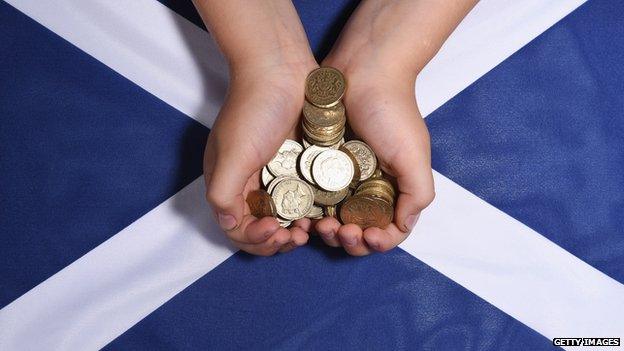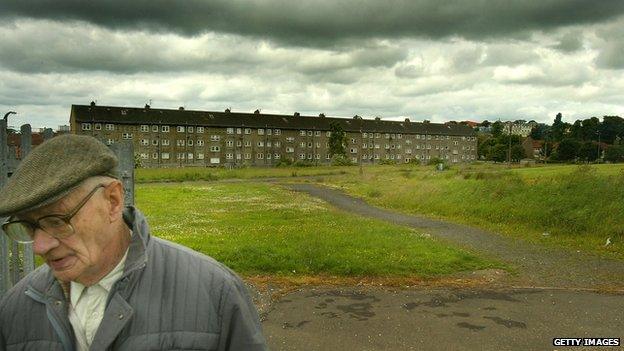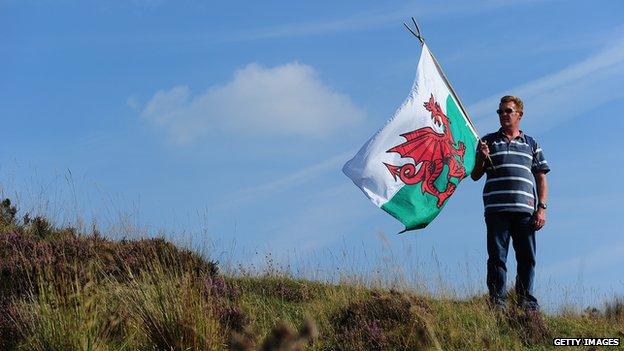Scotland votes 'No': The changes to tax and benefits in Scotland
- Published
.jpg)
Scotland has voted to remain part of the United Kingdom, but Scots can still expect significant changes in the taxes they will pay, and the welfare benefits they will receive, as soon as next year.
David Cameron has promised Scotland new powers over tax, spending and welfare - as well as promising voters in England, Wales and Northern Ireland that they too will have a greater say in the way they are governed.
Lord Smith of Kelvin, who was in charge of Glasgow's Commonwealth Games, will now oversee the negotiation process, based on new promises made by the Better Together campaign during the Scottish referendum, and known as "Devo-max".
Under those promises, Scottish taxpayers can now expect bigger - and earlier - changes than they previously thought.
A timetable has already been agreed to devolve some tax powers. These could be introduced soon after the general election in May 2015.
The powers would allow Holyrood to raise a further £2bn in revenues, and have even greater control over income tax than has already been planned.

Powers in the pipeline
The Scottish Parliament already has powers to alter the amount of income tax people pay, by up to 3p in the pound. To date it has not used this power.
But from April 2016, when the Scotland Act (2012), external is expected to become law, Holyrood is due to have greater power. It will be able to alter the tax rate by up to 10p in the pound.
The UK's basic rate of tax is currently 20%. But under the Scotland Act, that rate could be cut to 10%, or increased to 30% north of the border.
The higher rate of tax is currently 40% - which Scotland could cut to 30%, or increase to 50%.
The top rate of 45% could be cut to 35%, or increased to 55%, in Scotland. The Act requires that if one tax rate is altered, the other rates must move in tandem. In other words, if the basic rate were to be cut by 5%, the other rates would have to be cut by 5% as well.
However, these changes are likely to be overtaken by the UK government's promise of changes to tax, spending and welfare.

What will happen to tax?

Scotland is likely to get powers to alter tax rates by at least 15p in the pound
Despite David Cameron's announcement after the referendum result, the main Westminster parties are not yet agreed on what extra tax-raising powers should now be devolved to Scotland.
Both the Conservatives and the Liberal Democrats would like to cede virtually all control over income tax to the Scottish Parliament, including rates and bands.
However, a study for the Conservatives, chaired by Lord Strathclyde, suggested that Westminster should still have control of the amount that people can earn before paying tax - the personal allowance.
The Tories have also suggested that Scotland might have some control over VAT receipts.
Labour wants to give the Scottish Parliament less extensive tax-raising powers. It suggests allowing Holyrood to increase tax rates by up to 15p in the pound. So the 20% basic rate could be increased to 35%. Members of the Scottish Parliament could also decide to reduce the 45% rate, providing they cut the basic rate as well.
But until detailed discussions between the parties begin, many of these proposals are far from clear. Even then, compromises are likely before they are implemented.

What will happen to benefits?

Scotland could be given the power to abolish the "bedroom tax"
Labour is proposing that control over a number of welfare benefits be given to the Scottish Parliament.
These would include control over housing benefit - enabling Scotland to get rid of the spare room subsidy or "bedroom tax", a policy favoured by the Scottish National Party.
It has also proposed devolving the attendance allowance - paid to disabled people over the age of 65. Scotland would also control the Work Programme, used to help people find jobs.
The Conservatives agree on devolving housing benefit and attendance allowance, but the Liberal Democrats believe both should still be controlled by Westminster.
The first clue as to what Scottish taxpayers will actually be granted will come when MPs debate the issue on 16 October.
A consultation will open in November, and final plans will be published in January.
They are expected to become law as soon as possible after the general election in May 2015.

Wales

Wales is also set to raise some of its own taxes
David Cameron also mentioned on Friday devolved powers for Wales.
However, No 10 confirmed that there were no new plans for Wales, other than those already in the pipeline.
The Wales Bill - currently before Parliament - would allow the newly-named Welsh Government to alter the rate of income tax, providing it is approved in a referendum.
However, all tax rates would have to move in tandem, a restriction known as "lockstep".
It is expected that the Welsh referendum would happen after the 2016 elections in Wales.
If approved by the people, the Welsh Government would then be able to set its own income tax rate by 2018.
The bill would also devolve responsibility for Stamp Duty and Landfill Tax to the Welsh Government, as has already happened in Scotland.